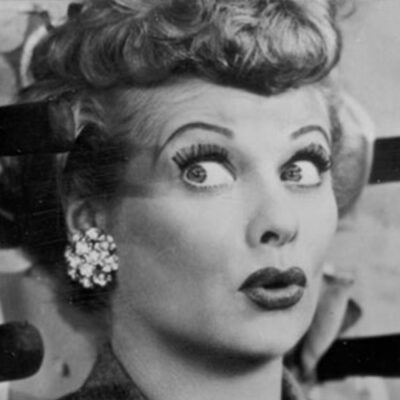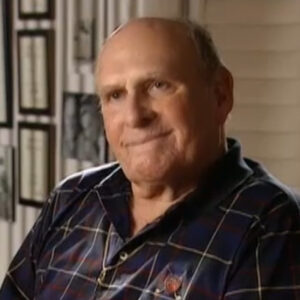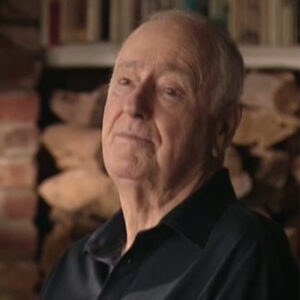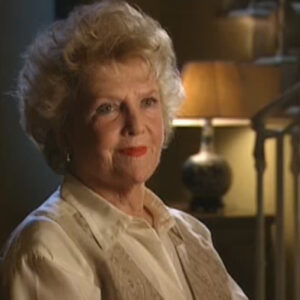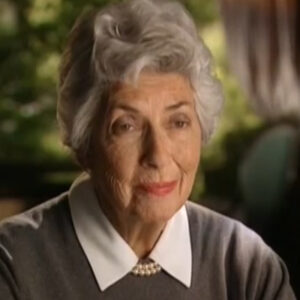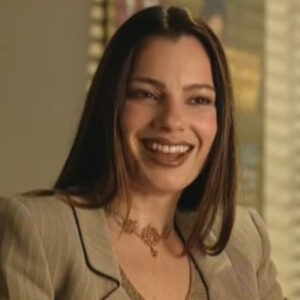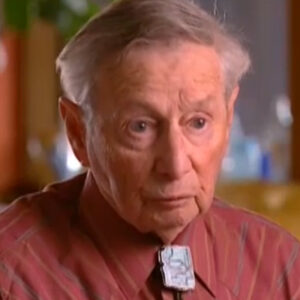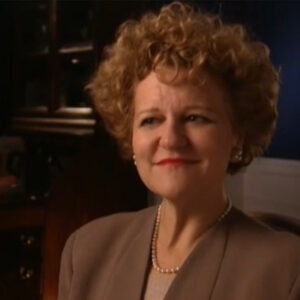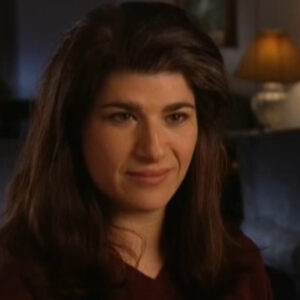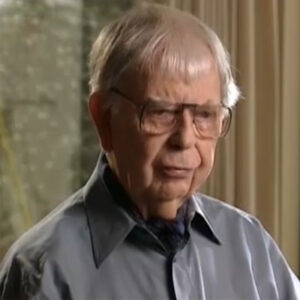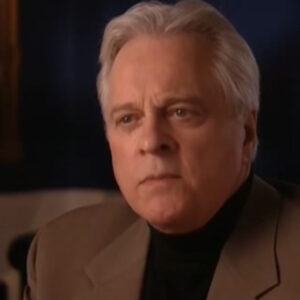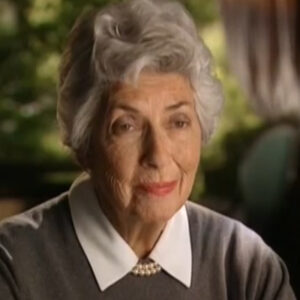Interviewer: Can just find a place and sit. All right, tell us you met Lucille Ball when you were each performing in a play called Dream Girl. Right. You could just tell us briefly that you were in a play together and what it was called.
Maggie Williams Well, in about 1947, Lucille was going to go on the road with a play called Dreamgirl by Elmer RIFs. And I had just had two little children and I was recut. I was the ultimate housewife. And she said, no, no, you must go back into the theater. That’s where you were and I’ll get you back into it. So I said I madley that I would go on this tour with her and we toured up and down the West Coast. And most of the character actors in it said she’ll never make it. It’s longer than Hamlet. She’s on the stage the whole time. She used to say herself and act one and two, I can’t even go to the bathroom because she was on the stage the entire time and she had to jump from moving platform. She had to eat. She had to take a shower. All these things that are so difficult on the stage that you could do wrong. I mean, one night breadstick did get cut, caught in her throat and she had a terrible coughing fit on the stage and we had to stop and pull down the curtain. So all this was very difficult. But she, being the total trooper, did come through Europe brilliantly. And so these character people were wrong. She was a wonderful trooper and could do it.
Maggie Williams Now, here she is, this actress who’s been in Hollywood for a number of years. She’s got a movie career going rogue. Why would she decide all of a sudden to risk going on the stage? What do you think she hopes to get out of the experience?
Maggie Williams Well, I think she wanted to do a play right from beginning to end a difficult play because she felt that you were never truly a seasoned performer. If you hadn’t on the stage. And she had done one little thing called Dingle Langer’s. I mean, what what was it called? A musical? That’s all she had ever done on the stage. And she felt she needed that experience. Also, it was a time in her life when Desi was on the road. Desi Arnaz was on the road with his band. And there was a sort of lull in her life and she wanted to bring her vitality back somewhere and give herself a challenge. And certainly it was that.
Interviewer: Do you think it’s where she learned how to perform in front of a live audience? Because after all, when you’re making films. All the people are there, just the crew, and they’re not supposed to laugh because they have to be quiet.
Maggie Williams Right.
Interviewer: Do you think she really learned how to work an audience and new and learn how to read an audience and the notion that each time you do a show, it’s a different set of people and the show is going to come out differently. Do you think that served as a training ground for her.
Maggie Williams Yes, she said that herself. She said that because we toured and places, as she called them, Yakama in Tacoma, and I haven’t seen an apple yet. She said here, but we weren’t all of Andol New, you know, the Seattle and all these places. And she said, I geared my performance to who was out front. If I saw that they were kind of innocent, more naive people, I tried to veer my performance to that. And yet when we were in the big cities like San Francisco, she came all out in a different way. So she was constantly working at it and thinking about it.
Interviewer: As an actor, actress yourself. Describe what it’s like to go in front of a live audience. As a non, I can imagine. Of course it’s not. It can’t possibly be terrifying every night because no one could stand that. But just the notion of why you’re putting on the line every time you step out in front of a new one.
Maggie Williams Yes, I think that’s absolutely true, that it’s a tremendous thing, especially in her case, because she was in her late thirties, I think, and she knew they expected the glamorous Lucille Ball. And she wanted to be so startling and wonderful all the time. And she really gave it so much thought that she drove us all mad. To tell you the truth, because after we left the show at night, she’d say, no, how can we improve that scene? And we won’t be talking for hours about how to change. And then she would get us up in rehearsals. She never stopped with that stuff. And for me to get on the stage with her was something because she was such a dynamo. And if I didn’t come up to that concert pitch, believe me, I heard about it. So did everyone. I mean, anyone in the show.
Interviewer: Now, was it your sense that she was nervous before you opened in Los Angeles? There was a lot riding on the reviews.
Maggie Williams Yes. Well, what happened is we had by now finished the whole West Coast and in Santa Barbara, she began to tighten up. And I said, what’s the matter, Lucille? She said, We’re going into L.A., my hometown, which, of course, wasn’t her hometown. As you know, she was from Jamestown. But she said they’re waiting for me to fall on my face and I’m not going to fall on my face. And I said, this is a new concept to me, said, I hope my naive way. I said, Why? Why would they want you to follow your face? She said, Are you kidding? All those dames out there? Well, of course, you met all the women she’d acted with. So we went there all and she got all the costumes refurbished. She looked at the set. She said, fix that, fixed this and gave us all notes on our work. And by God, we opened. And she was a huge success. Of course, she was wonderful at it, which all admitted at the time, all the critics.
Interviewer: Did you ever see any of her early movies? For example, Roman scandals?
Maggie Williams I did. I remember her and she had mud all over her face. I remember you know, I remember her in Roman scandals with mud all over her face. And she told me afterward that Eddie Cantor never forgot her because during the times they were taking those still shots of all these glamorous chorus girls. And she was a showgirl and it was a beautiful creature. When they took all these lovely women, they finally got to her and she opened her mouth with a big smile and had her teeth all blacked out. And that guy, again, Eddie Cantor, never forgot that. And I said, well, why did you do that? And she said, Because I knew I didn’t have any bosom and I wasn’t going to, you know, compete with those dames. So that was the reason for this clownish attitude, which was charming, everyone thought.
Interviewer: I think in retrospect, it’s hard for people to grasp the idea that Hollywood missed that in her maybe any candidate, but certainly her movie roles did not reflect for a long time comedic potential. What do you think that is? Is it because they just were too wrapped up in the idea that a movie star had to be glamorous? What do you think kept them from seeing comic potential?
Maggie Williams Well, I don’t think that she showed it to anybody. She had the wonderful clowning spirit of hers that I think that she was afraid or who wasn’t afraid, you know? And she’d said to me, I know what’s the matter with you. You say in your dressing and hoping we won’t call you. She said, I know all about that. I did it all those years at RKO. I thought, oh, God, I hope they don’t call me to the set. I’m scared. So you’d never know that her work, would you? I mean, she’s fantastically assured and everything she does. But I think that it took some time. Now, what was her first big comic role? Do we know?
Interviewer: Well she played, you know, she did some things early on at RKO, Affairs of Annabell and various things. She wasn’t terribly successful. I feel like her real brilliant breakout comedic performance is Miss Grant switchman. It’s fairly late. This is coming on right on the heels of I Love Lucy. Have you seen this?
Maggie Williams Yes. She was great in that, wasn’t she? She had all their prop stuff with a typewriter. That was another thing. She did wonderfully props. And she always watched people like Chaplin because of their great skill with handling props. And she developed it on purpose. She thought it was such a what is the word a crutch to have is. What do you call it? Not a crutch, really an accomplishment. If you were going to be required to do something difficult, you could do it.
Interviewer: Yes, I think that several people have told us about how serious she was about her problem. All right, well, let’s move closer up to the I Love Lucy period. Do you ever remember listening to her radio show, My Favorite Husband?
Maggie Williams I never did. I heard about it from her because she came through New York with Desi and they did a thing at the Roxy. They did a vaudeville show at the Roxy in between the in the movie performances. So I was at the time on a show called We the People, which was a television show. And to my astonishment, I went backstage at the Roxy to talk to her and she said, well, what’s it like being on TV? I said, My God. You know better than I. It’s just like being in the movies. Do you have to hit your marks and do all that? So she said, well, we’re thinking of doing this show from my from the my favorite husband is that was called a radio show. So she just said she you know, she told me that they were doing a show called My Favorite Husband on the Air, which are on the radio, which I had never heard. And she said, we’re thinking of putting that on for 13 weeks on television. And she said, Do you think I’ll like it? And I said, Oh, I think you’ll love it. It’s so easy for you to do that kind of thing. And here, of course, we were talking about a monumental thing that was going to happen and change everybody’s life. The I Love Lucy show, that’s what she was talking about. So then she had on this terrible costume shoot. The whole vaudeville show was about Desi Arnaz. It’s the same thing of the I Love Lucy. The idea here, you had the band. She wouldn’t she wanted to be in the band and to sing and he wouldn’t let her. So she came through the audience in this terrible outfit with a rotten hat and all these things and with a big old cello and began to set up a whole vaudeville act again with props. It was very difficult. You had to take them out of the cello. It was all sorts of gag things and it was just a brilliant bit. And then she had to, you know, play horns like a seal, like a trained seal, do all this stuff that is so difficult. And it was just a brilliant vaudeville show and the audience adored her and just, you know, raise the roof when she made her exit. So here we were talking about the isle, what came to be I Love Lucy under these very delicate terms, you know, as if oh, well, this may not make it. You said, well, we’ll do the 13 weeks. And if it doesn’t make it, what do we lost?
Interviewer: Now, tell me if. One part of the story that I think is so interesting is that when she was on the radio show, her husband was played by Richard Denning, American banker, very WASPy type. And she wanted to work with Desi. And yet the networks.
Maggie Williams Yes.
Interviewer: Want him. And then in some way, their resistance is what spawned this vaudeville.
Maggie Williams Yes.
Interviewer: Can write me a little bit about that.
Maggie Williams Yes. Well, I can remember at the time one chap at Young and Rubicam said who needs them? A Mexican, as he called the Desi and a washdown chorus girl. Well, that man must have been sent to the guillotine because they dropped them. No, I think that it was true situation. And Desi kept saying, well, why do we need them? We’ll put it on. Because everyone thought in those days that it was so shady to have a Cuban husband, you know, an American girl who in the public would believe that, which is hard to realize in this present enlightened era. But in those days, they thought it wouldn’t work. And, of course, as you say, it was a it was the making of Lucy. I Love Lucy.
Interviewer: I think the one part of that story that we’re missing is because I said it. And if you could say it to me. Sure. As I said, my voice is gonna get cut out there. CBS wanted to make this radio show and to be present, but she had terms in her terms were fine. You want to make this into a radio show, then desi guests by the husband and their basic reaction was, no way. No way, Jack. No. Then Lucy and Ricky really are Lucy. And Desi said, fine, we’ll prove to you that this can work. I mean, I think that’s the little bit of the storytelling.
Maggie Williams Yes.
Interviewer: Can you tell me that.
Maggie Williams So. Of course, she kept insisting that Desi should play opposite her if they were going to turn this radio show into a television show and they all said, no way, we’re not going to use this Mexican guy. I kept calling him a Mexican and he was from a very distinguished family in Cuba. I met his mother, actually, a lovely woman. So at long last, they she said to me, you know, Desi has turned into a wonderful business man. Apparently, she didn’t know that. He’s figured out that we can just do it ourselves without all these other guys that don’t want him in it. So I said, well, marvelous. I had sort of staggered by this news because we always sort of Jesse is, you know, Babalu and a Cuban piece. We never thought of it as a business man. So indeed, that’s what they did, which was wonderful. And the rest is history.
Interviewer: All right. You visited the set of I Love Lucy. I believe you told me that you were there during the early days in Hollywood and you went backstage. I remember hearing her voice coming around the corner.
Maggie Williams Yes, that was the interesting thing about her with all this wild. And she always played at a very high pitch. And she made you play at that high pitch, too, which was right, because as comedy is her. But when she was alone with you, she conserved all those energy and it was like a cello coming out from her dressing room. Her voice was so low and very and always conserving energy, always saying, well, you know, that’s the way we’re going to do it. Tell him to go stage left until the other guy to fix up his hair. You know, it was always like that. It was such a surprise to see her at work for that reason. She I guess she felt. My gosh, I better save this for the for the actual performance. So she did speak in that very low way.
Interviewer: Did you actually physically sit in the bleachers and watch taping a filming of one of the shows? Yes, I did. Because you’re the only person so far who has that distinction. Although yesterday we interviewed Ben Johnson and in the books it says Van was there. But he didn’t remember. Oh, really? You never seen it show up in the bleachers. But maybe since you are in a unique position, you actually have been there, sitting there watching that three camera system of taping a TV show line, which was a very new thing.
Maggie Williams Yes. Which Desi apparently invented that three camera idea. Apparently that hadn’t been done before.
Interviewer: So tell me just what it was like to be sitting there as an audience watching the taping of the half hour show?
Maggie Williams Well, it was marvelous because it was so.
Interviewer: I’m sorry. Stop once more and say that when I.
Maggie Williams Oh, well, when I went to watch Lucy tape and it was one of the most difficult shows that you could have taped because the I Love Lucy show, which is, you know, I had three audiences in the bleachers as her mother always sat next to me. Her mother’s name was Didi, a marvelous, gutsy woman who had been through hell in her life. And so now was rejoicing in this great happiness that her daughter had achieved. It was she was to be Lucille was to be shot out of a cannon. Can you imagine that? And all our hearts were beating. We thought ours is ever going to happen. Well, wouldn’t you know before it started? Gary Morton at that time was the her husband. This was one of the later shows. He came out and warmed up the audience and everything was OK. And then they started to start the show and somebody technically screwed up and the cannon went off or something. And and the whole thing had to stop right then and there. And then there was this dead silence. And Lucy had a great theory about never lose an audience. She said, if you do these things in audience, you’ll never get them back if you do it wrong. So attack and be there for them. So she ran out in her dressing gown, this glamorous robe, and she got that audience all revved up again. She said, Who is here from Texas? Stand up. I want to look at you now. Where are you from and who’s from? Jamestown I’m from. And, you know, she’s talking on and I’m getting them all excited. And they were just eating out of her hand and then this person on the can and said, I’m okay now, Lucy. She said, well, are we really okay? Yeah. We’re really going to start. Yes. So then they started again, did it perfectly. And she was shot out of the cannon and it was marvelous. After work, I went back to her dressing room with her. We all went in golf carts because her dressing room was far from the stage. And I said, well, how was that? She said, Oh, my God, never again. Why did I do that to myself? But it was a great hit. It was very amusing. And she really knew how to hold the thing together when something went wrong.
Interviewer: Going back just to the early days of the show and the early days of television, do you also have the privilege of being in the audience for the original I Love Lucy show?
Maggie Williams No, I didn’t ever see Desi in it, so I couldn’t have.
Interviewer: OK.
Maggie Williams I saw I saw it, of course, on the television all the time because it was marvelous. I thought it was terribly funny.
Interviewer: All right. Tell me a little bit about that. Do you know people were you one of the people who made a point of staying home on Monday night to watch the show?
Maggie Williams I certainly tried to.
Interviewer: Can you tell me that?
Maggie Williams Well, I was so interested in her technique because I was when I started as an actress. Well, I had already been in the theater was when I met her. And then, as I said, I had two little kids and I went back into the theater and I was having great trouble with the part that I was playing. I played her sister in Dream Girl. And then on there was the second part of a very hot a woman who comes into a theater and intimidates everybody Bahra enormous sangfroid and goes about it. And then she has to say hello to everybody and she suddenly says hi. And we all realize that this is all a fraud, that she’s rather a less than a half a woman. She is, in fact, a prostitute or something. Well, I could not do this part. And Lucille kept helping me with it and saying, oh, my God. So finally, she took me to her dressing room at her hotel room where we lived. I lived down the hall from her and the Palace Hotel in San Francisco and she said, I’m going to tell you how to play comedy. So I went to her room. She got me all done up with curlers in my hair, did my fingernails, made me put on a robe. I mean, she always did that. She had a compulsion to be in a beauty parlor and you were the subject. So having done all that, she said, now I’m going to show you how to play comedy. She said, first we order our dinner. So she ordered off this asparagus hollandaise and all this stuff. So she said, now you stand up at the other end of the room, you’ll put your chest out on your pelvis forward only if you use more graphic terms, which we won’t use on television. And she said, then you come on and you scare the hell out of everybody and then you say hi. And so we went up and down the room, these two big tall girls with our long legs saying hi, in came all the waiters with the asparagus and the whole thing. And they thought, what is this? Oh, are these down? And they kept trembling. And those they were giving us our hollandaise sauce. So, of course, at the end of it all, I was wonderful, Anna, because we were both up there doing the same thing. I was doing her part and the musing end of that story, which you can cut out if you want to. All of a sudden, Desi appeared, he had been on the road with his band and now he was coming to the Palace Hotel to play, his whole band was there, and then the door burst. The Latin lover here was I with my curlers and my fingernails and my robe and all the thing. And I thought, oh, my God, let me get out of here. These two want to get together after a six month separation. So I kept trying to take the rollers out and I kept trying to say, Oh, hi, nice to see you and running out the door. So I ran out and I realized I’d left my heart, my scripter, so I had to go back. So I ran back in again. And before I can say anything, they were on the couch. She was under him saying, but when did I ever like RCL? That was perfect. So I would I destroyed their liaison.
Interviewer: Well, tell us a little bit about their romance.
Maggie Williams Well, it seemed to me that he was always wonderful. I loved him. He was amusing and charming. And God knows he always said wonderful things to women and one, wherever she kind of got mad, he’d say, Don’t you lower your voice to me, you beautiful woman. So it would be like that. But I think she was sort of childish, whether it was sort of like being with your mother or something. It always was I. Am I pleasing her? And this is going right. And it was a peculiar relationship, I think, because of her enormous ability and organization and managing things, that she kind of fell into that role with him, too. But did she love him or. Very much? They were madly in love. There was no doubt about that. They were always, you know, they couldn’t keep their hands off each other. It was just it’s such different temperaments. I mean, he totally Latin and she. Not at all. Willing to play this sort of humble wife, I guess that’s what it was, sort of. I’ll give you one example that I thought was sort of terrifying to me. We were now at the Palace Hotel. He had opened. He was a big success. And she showed up every night. We all did. To see his show because it brought customers in. And she was very supportive of anyone. She knew everybody was supported by our view. She chose you. You were lucky. So he had it was their anniversary of their wedding. And he got in front of the table, the spotlights on us all, of course, singing. I didn’t know what time it was, which had she had song in too many girls was his big romantic singing and he sang it to her. Well, the audience adored it here with the two lovers. And he was singing this piece. So everybody was happy and then he came back to the table later and said, darling, value is going to be in the audience tonight. What shall I sing? And she said, well, whatever you do, don’t sing. I didn’t know what time it was. What did that mean? I don’t know. That was not my way of treating a man. So I was astounded by this. I don’t know what it meant to this day.
Interviewer: Since you were there and you did see him perform, describe how he was onstage in his Cuban Bronco player role.
Maggie Williams Oh, he was wonderful. He was so he’s enjoyed it. That was the first thing you can see is happiness to be playing these drums. And that went over to little Desi when he wanted was asked to choose a school. He said, I only choose a school where I can play the drums. So we choose chose a military school, of all things, which amused Lucy very much. She loved to go over there and watch them drill and all that. And she, again, with this great interest she had and other people, she always was noticing you. She noticed. Well, she was a true executive. She noticed the card boys got their names, got everybody’s name, knew everybody who everybody was, makeup people, the whole thing, and always address them by name. So being a true executive, they all knew they were noticed. So she went over to look at the little desk doing his stuff in the military school. And a big voice came over the loudspeaker saying, Colonel Morrison, you’re wanted on the telephone and nothing happened. They went on drilling. And the voice came again. Colonel Morrison, please answer the telephone. Nothing. And she said, then all of a sudden a voice came on and said, Colonel Morrison, your mother wants to talk to you. So was the result of all this grandeur of being a titled person in the army of this group that killed her? She always notice things like that, and which was one of the reasons she was such a good actress. I think she did not think I am a star, but she was very open to what was happening around her.
Interviewer: And just to go back to Desi for one second.
Maggie Williams Oh, yes.
Interviewer: The idea of his appeal, I mean, even watching him on film, which is, of course, my only experience of him and watching him play the bongos and sing the ballads. I mean, it just kind of seduced everyone in that audience with his. Oh, yes. If you could. Just paint a picture for us of that nightclub ambience, elegant clothes and how he played to that audience.
Maggie Williams Yes. Well, I thought Desi was a wonderful nightclub performer and rather a wonderful performer. But I think the first thing was the joy that he really loved that and loved you. You know, these are Cuban cab even go around and went to the tables and all the women thought, oh, he’s mad about me. I can see it even if I had that great velocity to relate to people. And he had had such a hard beginning because he and his father were kicked out of Cuba when Machado lost the post of president and Batista came in. These people, he everything was taken from him. He was brought up as a princeling with his own speedboat, his own Mercedes Benz, before he could drive one. And here he is put in Miami and they had to live in a warehouse. And he told me his father, who was father, who had been mayor of Santiago, had to sleep on a pool table, the two of them. And they did it with great spirit. They were as sure they were going to be all right, which I thought was marvelous that they had that spirit of this all going to turn out all right. And of course, it did. Jesse got jobs in first with Xavier Cugat and then it went on to get in a Broadway musical, which was marvelous, a great jump forward. And I think he was. I think his major thing was that he was truly musical. That was good. And he loved it when Lucy would come up on the stage, when he was with his just with his band and sing. She often came up and sang Peter Piper picked a peck of pickled peppers or some terrible tongue twister, which obviously I can’t sing. And she she the audience loved that. And in the hotels, they found that very wonderful to see the two of them working together.
Interviewer: Do you think he used. Take a sip? They’re gonna. I guess what I was going to ask you next about Jesse was whether you thought that that same farm and the way he had with people was one of the skills that he used when he went on to become a major player in the television industry and an executive producer. And basically, he marshaled a lot of people and had to work with a lot of people in that role. Do you think he pulled on those skills?
Maggie Williams Well, I think Jesse, as you said, a great business man. Yes. I think his charm had a lot to do with how things worked out. He inclined to take the Zen way out. You know, it was never a confrontation. It was always, well, that can be done. We can do it, you know, which I think helped a lot. And also, his judgment was wonderful. He had very good ideas about what they could do, as I say, he did. He thought of the three cameras, some cameramen is going to tell me I’m wrong about this. It always is said that he thought of to shoot these things live with three cameras. So that was a brilliant idea right there. So he he was a person with enormous skills and talents, which I don’t know if the general public thought that or not because they thought of him as this, you know, Cuban cabby that always was this curse in life.
Interviewer: You would talk to me when we spoke on the telephone about their relationship. The good and the bad and I guess. What were the problems? How in what way? With a mismatch for one another. Why do you think it didn’t work out?
Maggie Williams Well, I think that they were the decision, Lucy, were so from such different worlds. I don’t think she had much feeling for the or not. That isn’t a good word. She I don’t think she had much idea about where the Latin culture was. I was very aware of that, having lived in Rome and all those places and knowing how Latin men are. But she was never rude sparing. She was truthful all the time. And sometimes that’s a mistake. And I think that. Well, I’ll give you one example. When they married here in New York and then they got on the super G and when they were first you go in the 20th century, then you get on the super G. The whole way back. She told me that he kept going into their state room and playing as a guitar, and that sort of infuriated her. She thought she was being this neglected person. And I said, well, what was the matter? Why didn’t he. Why did he do that? And she said he was writing a love song for me. But he didn’t tell me there. So she said by the time we hit, you know, the L.A., I was an old fury against him. So that was sort of thing where they were ships that passed by the night. Here he was doing something for her but didn’t tell her. And she wasn’t telling him that she was furious. So that was an example of how they passed each other in the in their lives, I think. And I only saw the good part of their lives because, as I say, she was so supportive of his band and she did do a lot of good for him, you know, showing up and being charming to everybody and singing, as I said, with the band. And sometimes he’d even come off the podium and they would do a little routine that they did of Susie, Sweden. She did that later on. The I Love Lucy show is a charming little routine that they had worked up.
Interviewer: I guess the thing that I’m remembering from our earlier conversation is that temperamentally how they chose to have fun was very different. He was a party boy and he liked to go out after the show. And she was a hardworking gal and she basically wanted to go home and rest at night. Maybe you could tell us a little bit about that.
Maggie Williams I think that one of the things that Lucille told me about after were several carders shoot these shows and to do be fired out of a cannon. Among other thing I said, you must be exhausted and so forth. And she said, yes. So after it’s over, I’m dying to go home and put up my feet and talk about it. And she said and Desi is absolutely the man who must go out on the town and change that. He’s all revved up and he wants to go out nightclubbing and drinking and laughing and I want to go home. So there was another point at which they were separate people that each one had a separate goal. And I think after all the work of doing those shows in a week, she just wanted to relax and think about what did she done right? What did she done wrong? I mean, that was another thing, big analysis of everything that she always had because she was, as I say, absolutely determined. She was a perfectionist and determined to get it at the ultimate peak about what anything she did. So that was probably one of the big problems that he wanted to be drinking and she wanted to be home.
Interviewer: How did you feel when you heard that they were going to divorce? Were you sad? Were you surprised? Were you thinking it was inevitable?
Maggie Williams Well, I was sort of sad because I.
Interviewer: Say it again.
Maggie Williams Yes. When I heard that they were going to get it. I said, well, when I heard that they were going to divorce, I really was sorry because I felt that they could have gone on the way they were, despite this enormous difference in temperament. I thought they could have. Made a go of it, but obviously I was wrong. I think, again, this thing of his always wanting to be out partying and wanting to be home and be a home folks person obviously made it impossible. So they did divorce and remain friends. I thought that was very good because he would show up at various things. And, you know, whenever ever there was a kid’s birthday or when there was some kind of a reunion of, you know, a Christmas or something, they all got together with the new spouses. And that worked out, which is unusual.
Interviewer: I think Mike Dan from CBS knew her, particularly in the 60s when he felt Desi really never left her life.
Maggie Williams Oh, yes. I think and the vice versa. I think that Jesse never left her life and I think she never left his. I think that was a big. There was such a bond between them, it would never be broken.
Interviewer: Did you have the opportunity to go to their home in Chatsworth?
Maggie Williams I did.
Interviewer: Can you tell us a bit about the mood?
Maggie Williams Yes. Well, we had been on this tour with Dreamgirl, and after six months, we returned to Hollywood and we were doing the play there, doing the play it down at the Biltmore Theater. So she got us a little sort of shack near her place in Chatsworth. So we spent every day with her at her. They call it a ranch. And we met a lot of the people who had worked with her and Sedgwick, who had been a director of hers and sat around the pool and to us, to me, were all there. It was a sort of ranch life of a sort of star of life, in my opinion, which is absolutely dreadful to save. And what it was not to be charming. And here was a sort of. It was a very comfortable house and all that. But it had no elegance about it. And it seemed to me she was sort of an elegant person. Later, she became very elegant, went to Roxbury Drive and in Beverly Hills and had a lovely house there, which is more to my fault, the sort of how she should have been. But anyhow, they did did have fun in Chatsworth. They’re great friends. Marianne and Francis letterer live nearby. They saw a lot of them. So there were lots of people around that they liked.
Interviewer: And some people have described to us that, well, on the show, she was the kind of charismatic, zany, outgoing one. And he was more of the straight guy. Those roles got reversed. Was that your experience?
Maggie Williams Yes. I thought their roles were reversed at home because he, as I say, had all these wonderful things he said to women all the time that made women so happy. And she would be much more of a tough guy around there, you know? Well, I thought you were gonna wash the dishes or something to pull that glower down a little bit. So it was. Yes, I think that was the way it was. And he would love to sort of do the Congo through the living room. Your own really elegant view, the glamour puss there. And she kind of looked at the the way you look at a performing dog, you know, how charming. But what does it mean? That sort of thing?
Interviewer: Was she a funny person?
Maggie Williams Very. When we went out to the show every night. We were also relieved. We went out and you’d think that then she would be saying, let me go home and sleep. But she’d say not at all. And we would go to hotel rooms and we would all have a drink. And she’d say, let me show you what elegant food or do. So she plus she danced the Charleston like a a snob for all she said. Now I’m going to be the tramp. And then she danced the Charleston. She invented all these dogs that she was dancing as these dogs. And it was wonderful. That was sort of like Chaplin. I kept staring at her in amazement that she had all this inner talent going on for her that she could, you know, draw upon and be so charming. She didn’t like to go out much with the general public. And I said, well, why not? Because they of course, she was invited everywhere. And we I always went with her. I said, well, why do you hate that? So when she said they think they own you and it was true that once you got in someone’s house, they just push you around. And they photographed her and they made her meet this one on that one. And she didn’t like that. I mean, it was it was presumptious, which is true.
Interviewer: We have this amazing footage of her at the 1964 World’s Fair here worlds really where they had a Lusi day in August where she toured the grounds and the fans were there applauding. And she seemed, at least in these movies, to be very willing to sign autographs and sort of play the part where her public. Is that your sense?
Maggie Williams I think she was wonderful with the public when she was doing Wildcat. I went backstage there several times and we’d go out to dinner and of course, they’d all be at the stage door. And she would just organize it, which was great. She’d say, Everybody, I thank you for your interest in me. If I sign one autograph, I must sign them all. And therefore, I will sign none. But you understand my point. I’m going out to dinner and I haven’t got time, but thank you. So should you acknowledge them? That was what they wanted, of course. So what she did that. Everybody calm down. She was never I never saw mean to a fan. Just that one that we when we were in L.A. doing the play, we she made the same speech at the stage door because she was actually ill. She had gotten this terrible flu and she was dying to get to the her car, which was in a parking lot. So she and I ran after she explained why she wouldn’t sign the autograph. We ran to the parking lot and a woman chased her there and said, I’m not letting you go. You here, sign this. And Lucille said, OK, where is your pencil? Haven’t got a pencil. Well, give me your pen. Well, I haven’t got a pen. She said, What do you want me to do? Bite my initials on it? That is the end of that. The woman staggered away.
Interviewer: I think you told me that Lucy did share some details of her childhood with you, that you were able to make a connection for the kind of adult that she would become. It’s my sense that she was left alone a lot as a child and expected to sort of fend for herself.
Maggie Williams Yes.
Interviewer: Can you tell me a little bit about that?
Maggie Williams Well, Lucille told me that when she was a little kid, she was very young. Her mother found a second husband. Her own father died. And now she went back to live with her Uncle Fred in Celeron, which is a suburb of Jamestown. And I always thought it was Uncle Fred, rather grandfather Fred, not uncle, who gave her this great ability to organize. He was one of those men that could fix everything, you know, if your dog house fell down. He would build it up. He would think of ways to put doorknobs on that were better than you. And I think she inherited a lot of that idea that things can be fixed. No. How so? She was left with a rather unsympathetic family as a very young age. I think she was five. And she said they made her wash dishes. They put a little soap box there and she got up and washed dishes and she immediately never had any self-pity. She said it didn’t hurt me. It didn’t hurt me. She was very determined that, yes, I was. You know, Oliver Twist washing the dishes. Not at all. So that that thing of being alone a lot. She told me that they used to find her in the corner reading the Bobbsey Twins all the time. And I think she, aside from that wonderful grandfather, did have a lot of time alone to dream and think and also practice a little dancing. She always wanted to dance and so do that sort of thing. So she had a she had a good childhood. I think despite the fact of being separated from her mother, she also told. The mother had to work and she and her brother Freddie were this was, I don’t know, probably outside Jamestown again, that the mother demanded that by the time she got home, they would have peeled the potatoes, had them on to boil and had the beds made to have the dishes wash. All these things had to be accomplished before the mother came in the door. So they waited till the last moment they’d look. And there came the trolley car and there came the mother. And they’d quickly go, You’re not going fast action track and quickly do all these things. And as the mother came in the door there, it all was. But I think that do as we called her mother was a very good influence on those kids. Again, she was right. Right. Working herself and kept saying to them, you know, you have to you have to hold up your end. So Lucille always had that idea of give something back. Don’t just be a sponge.
Interviewer: It’s my sense from everyone that we’ve talked to that she did take an interest in others and give to younger performers. And it’s my sense from reading the things that you’ve written about her, that she was actually someone who encouraged you to become a writer.
Maggie Williams Yes. One of the great things she did for me was to encourage me to be a writer, because obviously she said to me, I go to the curtain call and I take my vows and I look down the road and you’re not there taking a curtain call. You said you don’t want to be an actress. You’re unhappy. Get out of a beer writer. I have all your letters you’ve ever written. And she had them in this huge envelope. I was astounded. And she said, you should write. She said, what do you do? I said, well, actually, I do go to my hotel room and write. You said yes. She says, start an undo there. Don’t don’t get in plays and not come to the curtain call. That’s the most on professionals. And you can do so thanks to her. I did start writing and I began to get I joined a workshop down in Greenwich Village. I got stuff done off Broadway. And eventually I ended up writing television. I wrote shows for Dobie Gillis and Bachelor Father and those shows, and it was all due to her. I would never have thought that I had that. And she said, you’re funny. You say funny things, you say original things. You shouldn’t stop there. And so she was not only with me, with everybody. There was one actor in the show called Andy Dugan, and she encouraged him. She said, come to Hollywood. You’re Abe Lincoln. You’re an ugly, handsome man, and you’re Abe Lincoln and Carlat come in there and and do your act. So she was always thinking about younger people. And when my son, Anthony McCay started to go into the theater, she said, tell him to keep it up. Tell him to, you know, do his best and get something. Don’t don’t quit. Just start. And, you know, buckle down and be an actor if that’s what he wants to be. Because, of course, I was appalled that he wanted to be an actor. So he turned out very well.
Interviewer: All right. Let’s turn off the camera for a second. We’ve talked about Keaton. I’m sorry, we’ve talked about Chaplin. And some people have indicated that she didn’t know Buster Keaton, that Edie Sedgwick had been Buster Keaton’s director. Certainly very close to Sedgwick. Is it your sense that he taught her things about comedy? Did she ever tell you anything about working with Keaton?
Maggie Williams Lucille never told me about work. Working with Keaton. Maybe she did. But she did run a lot of the silent movies for pantomime. She was extremely interested in that and noticed what they did and how they got laughs. And she kept saying, it’s a surprise that gets a laugh. That’s what it is. And of course, Keaton was such a deadpan comic, wasn’t he? He was. I think that interested her a great lady that he got such a laugh that you shouldn’t read drinking water during my speech.
Interviewer: That’s true. We talked a little bit about RKO. We have a sense from some of the people we’ve spoken to that there was a great triumph when she and Jesse, a few years after they had been let go, essentially turned around and bought the studio. Can you tell us how you felt about that?
Maggie Williams Well, I thought it was wonderful here that yes, in the beginning, I thought the greatest thing that happened was here was Lucille, who had been a contract player, RKO, and thrown into any old bar that she didn’t want and DLC and both getting fired and then both going back and getting their total revenge of buying the studio. I mean, what could be more wonderful in life than that? I thought that was great. So did they. And that was when she kept saying he’s such a wonderful business man. And she became a genius business person herself. She knew all about percentages, all those terrible words that people say, do you know, the contracts and so forth. She understood all that which I admire tremendously.
Interviewer: Well, she did then go on to buy him out.
Maggie Williams Yes.
Interviewer: Can you tell me a little bit about that period?
Maggie Williams Yeah, well, she did then buy him out. And it must have been. I didn’t see much of her. Never was out there at that period, was I, out there, you know? She seemed to get much more solemn after she became the head of the studio herself. She used me. She seemed to take on this whole thing in such a way that she’d began to carp car park mental lies her time, you know, to compartmentalize her time. And, oh, I was living in Vista, California. And I would come up to do the show, to write this show. And I would go see her. And it would always be. How much time are we going to spend together? That she was so driven by this tremendous responsibility that she couldn’t just sit around with you by the pool and dance like a poodle anymore. She had to think, what am I doing? And who was here? And. And she would always take notes on what was said, which is a strange thing. But in any event, I think that it was a huge responsibility. But she had good people around her that she listened to.
Interviewer: Did you ever go to one of these Desilu picnics? I guess even before Jesse was out of the picture, like in the 50s, the company would sponsor these family picnics for all the various individuals around them.
Maggie Williams No, I never went to their picnics. So I tell you, in the fifties, I left America and lived in Rome for quite a while. And I miss that whole period of their lives. So I don’t quite know. I’m sure I missed a lot of the shows, too, unfortunately.
Interviewer: One of the things that I enjoy when I watch the I Love Lucy show is the girlfriend relationship between Ethel and yes, they were just meant for each other. In a way. They were as you know, their coupling was as important to the success of the show as the marital couplings were. Just the ideal best. Yes. Can you talk about that even from the perspective of a writer? And if you agree that that’s part of the appeal?
Maggie Williams Oh, I think that that they were that the relationship between Vivian Vance and Lucy was a big factor in the fact that they played so well together when they got on the set. I saw Vivian Vance in Florida after she left the show, and I said, how did you ever leave? She said, I had no life left. It was just that show. And she said, I never spoke to my husband. I was learning lines all night, going on the set all day. And she said, Do you know what Lucy’s like? She’s not going to take any kind of anything but your absolute best. I said, I know that. And but it must have been hard to leave. She said, no, it was just an absolute Marazul. And toward the end, I just couldn’t take it. But she adored Lucy’s who didn’t. And we both spoke about that saying of her doing your hair and your nails and always thinking about how you were looking and should you wear that or should you not? That was a very sort of generous thing about her.
Interviewer: I guess I want to ask it again, but not this time. Vivian and Lucille Ball. But the characters, the story.
Maggie Williams Oh Yes.
Interviewer: The relationship that the writers created, schemed. And it was really was always the same. Lucy was cooking up the scheme and Ethel was saying, oh, come on, Lucy, you’ve got to be kidding. And before she knew it, she was off to the races helping Lucy with her crazy scheme. And you just describe that relationship?
Maggie Williams Well, I think that that relationship between those two characters was terribly funny and terribly human. I think women are like that together. The one Sarah’s the segment they did on the Tallulah Bankhead moved next door. That was just hilarious. You know, these two dames trying to see the great star and and, of course, the great star comes in and finds them with a telescope trying to spy on her. It was so funny and so human because I think women are like that. What is the star wearing or what is she doing? And also their relationship about having little catfights and then getting over it is so human. And I thought that was very well written that whole all those segments were well-written.
Interviewer: Well, if you had to know in a few sentences, summarize why the show was and is such a classic and so near and dear to people’s hearts, what would you say?
Maggie Williams Well, I think, first of all, it was very funny, which, of course, is near and dear to all our hearts. But second of all, I thought it was very human. I thought it was such a human situation. Of those two terribly provincial people, the marches were there down to earth attitudes and then these two kind of butterflies, these exciting, volatile people up against the two square people. I think that is such a good juxtaposition of characters. And of course, we all longed for her to get into one of her new schemes and screw everything off. The way she did was so amusing. I love the one in Italy, the one where she gets in the wine VAT. That was just great. All right.
Interviewer: I think my last question is to take you back to the time when you were on we the people that showed this earlier. But I just want to go back to that for a moment, because it’s our sense from what other people have told us, that they were actually very calculated in their study of this new medium television, that they went around to different shows and took notes and watched how TV got made. Is it your sense when they came to watch your show that that was going on? Can you just tell us that they did come.
Maggie Williams No. When I was on that show called We the People, we were the sort of forerunner of the Today Show. We had everybody on it from Mickey Mantle to Justice Douglas to, you know, Audrey Hepburn, who was just starting in. Lucy never came to see it. But she asked me a lot about it, about what it was like. I said, well, live television is death. I said, we have more mistakes on that show. And, you know, people on and running into each other’s running into camera angles. Because we’ve dealt with the public all the time. And I said, well, but of course, if you have just a regular show, you’re not dealing with the public, you’re all right. So but I was astounded that she ever asked me about that. And then those those cameras are so cumbersome. I mean, those huge cables and the fact that you had to, you know, age over in one second from a young person to an old and you had to do it, you know, while cameras were running it, all those things, because we didn’t have tape when we started. That came in later. So it all it was it was such a high wire act. Of course, that wasn’t so with her because they could reshoot if they had to. But they didn’t like to because of course, they the whole reason their show was so wonderful was the audience was giving their part of it. The audience was another character in the show. So that, as I said, she doesn’t wouldn’t let that slip away from her. She got them on her side and tell them there.
Interviewer: All right. I would like to take this opportunity to ask anyone else in the room who has a question they want to ask something that I’m curious about.
Maggie Williams Just as interested me greatly about it, which shows you how alert she was. During the course of this run? I thought it last time away from my children. I can read War and Peace. I promised myself that all my life. So she saw me over there with this huge book and she said, Now, why are you doing that? I said, Because I never get a chance to read anymore. She said, That’s right. The classics teach us everything. I’m going to go get a book. So she went to a bookstore. I thought, what is she going to get? And back she came with her diaries of Sammler Pete. And I thought, she’s never going to read that. Well, my dear, she adored it. What what could be better for her than the times of the late 17th century? And she said, guess what? The king’s underwear is on the line and everybody sees it. And guess what they did at The Hague. She had read the whole thing. She understood perfectly. And she said and all he did was say, I shall go now. And sport was a maid. She said, isn’t that marvelous? It’s not. She she related to this so-called classic, just like a human. And I thought that’s the secret of this woman. She relates to real life and to anything she does with a human touch. And she kept talking me about the classics. She always was in awe of anybody who loved Mozart and so forth. In fact, the one night that Noreaster value was coming into the Palace Hotel. When does he was band was playing there. She is, he said, I thought a play. Singing Also Meow, meow. I’m a pussycat. You said everybody knows that. And he looked at me and he said, Well, do you know what I said? I don’t know that meow meow song. And she said, Well, don’t listen to her. She’s from Mozart. So how was it then? Well, she had there’s all of anybody who loved votes or art or anything of that nature. And yet she herself was so proud with the lifeforce that these things were not hard for her. She would understand anything because it was human, you know. So that was her great secret, I think.

